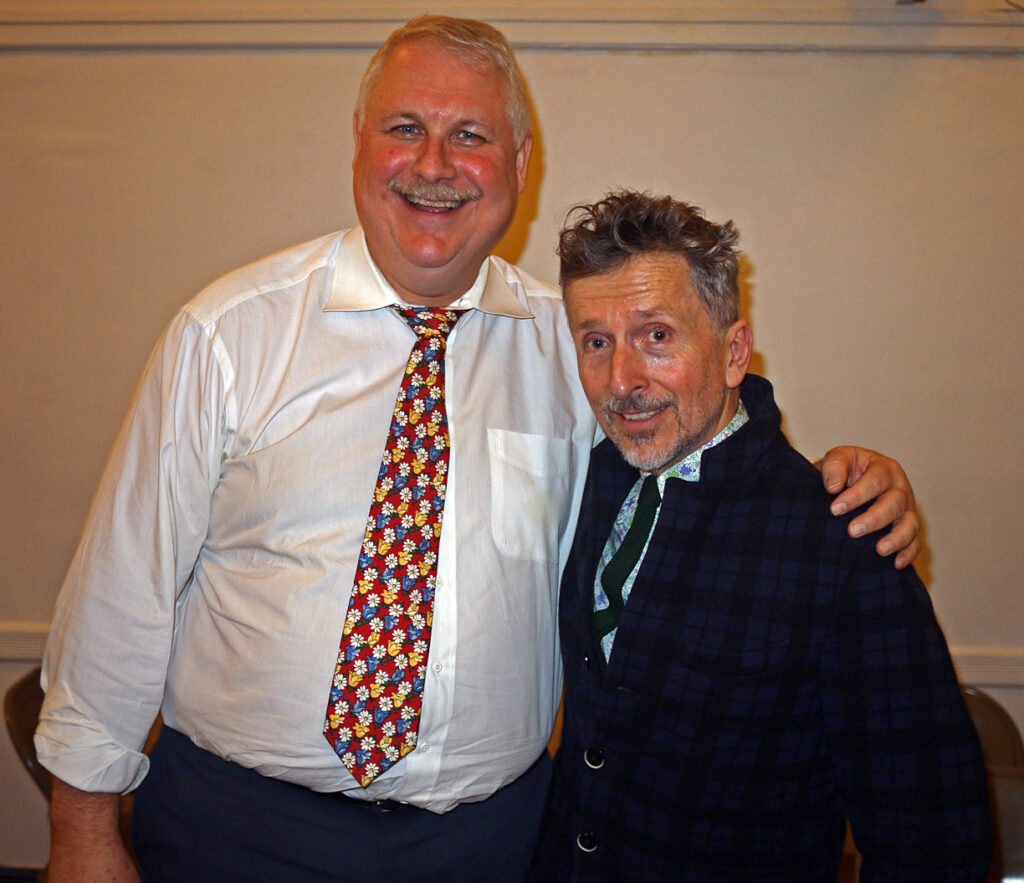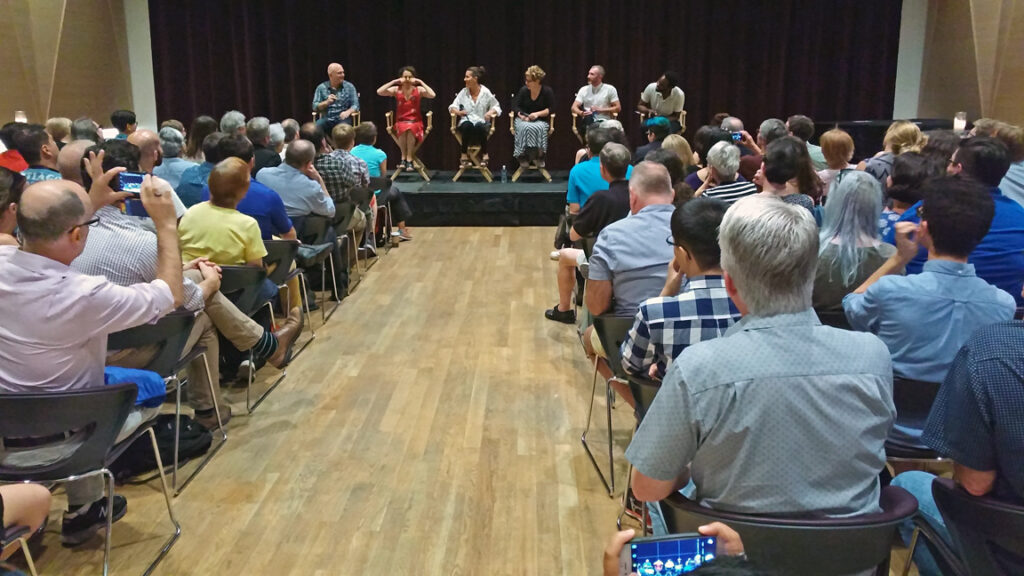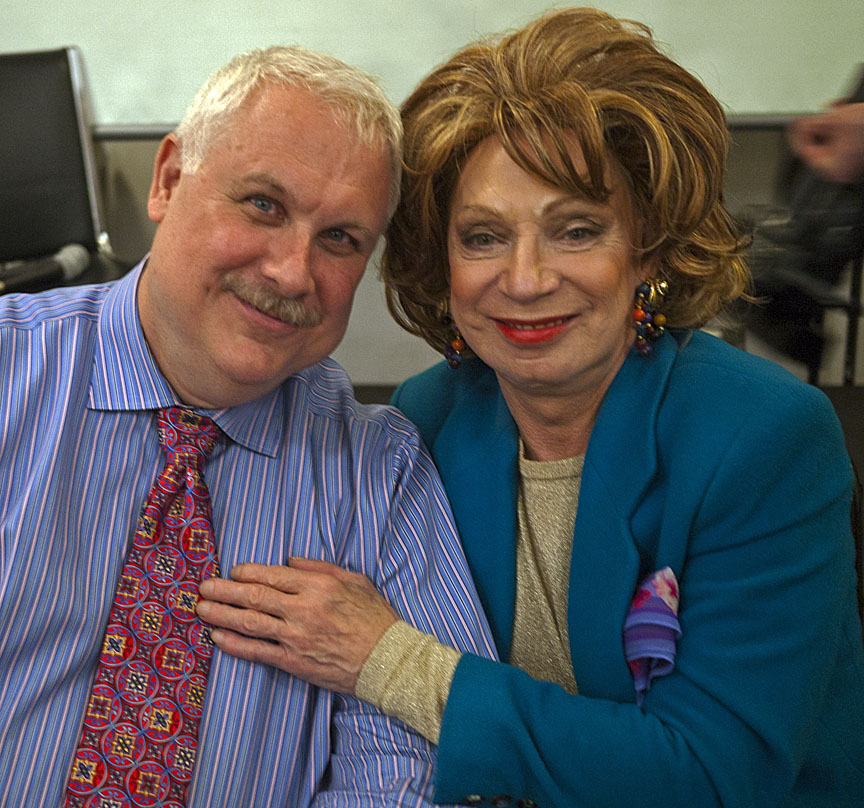Dudgrick meets…Howard Williams
Howard organizes the book club and the Second Tuesday lecture series at New York’s LGBT Center, hosting queer speakers and exploring a wide range of topics, virtually.
Howard, thank you for taking the time to talk with me. Tell us a little bit about yourself and what you do in the LGBTQ community.
Howard: I’ve been in NYC since 1993. I’m thrilled to be appreciated at work during the current Covid lockdown and able to work full time from home. My husband has a dream job: He’s an underwear analyst for a large data company. It’s more complicated than that but it just sounds so good to say “he’s an underwear analyst.” He’s also working from home full time. We lived in Chelsea for more than 20 years, lost our rent-controlled apartment and had to move, but it turned out to be a blessing, We’re in a larger, brighter apartment in Hamilton Heights, not far from you, where we have enough space that we can both work from home during the lockdown.
Tell me a little bit about how the book club and lecture series have changed since shifting into the world of COVID?
It’s been a pretty smooth transition. The book club has core membership that comes most every month, so we know each other’s quirks and personalities. The Center posts announcements for the books every month so new members show up almost every month and a few become regulars. The monthly email list is pretty big but a lot of people are only interested in certain types of books (memoirs or non-fiction, for example, or classic fiction) and others just enjoy reading the monthly summaries, I think.

After book club, we used to go for a late night dinner at The Good Stuff Diner on 14th Street. A few times, discussion there went on until after midnight. I miss the Good Stuff Diner where they’d let us sit for hours and those in-person discussions.
The Second Tuesday Series has a different type of speaker each month so it doesn’t have the same consistency as the book group. It has artists, authors, politicians, performers, religious leaders, panels, athletes, poets, almost anything that you can think of and people only come to the ones that they’re interested in. The best speakers have their own posse and bring their own fans to the presentations. Because it’s The LGBT Center, the emphasis can be more open and sexual than a talk at Barnes and Noble (remember when Barnes and Noble used to have talks?). And the audiences are much more invested and often ask much more pointed and thoughtful questions than “What are you working on now?”
Are there any positive changes? Things you can take with you after the pandemic? I know as a poet, I think more readings are going to broadcast even once they go back to live venues.
In the book group, we’ve had a few members who’ve returned to the online discussions after years because they’ve moved and can now attend.
In the Second Tuesday Series, we can invite speakers from anywhere in the world. So far, we’ve had speakers from Upstate New York, Massachusetts, California, and Winnipeg, Canada. The Second Tuesday Series and The Center don’t have a budget for travel so we were always happy to grab speakers when they were in NYC but we can’t afford to fly them in. Now, it’s much less of an issue.
The Second Tuesday virtual talks are also recorded so that they’re available on The Center’s YouTube channel for posterity, which is a huge plus.
Diversity and inclusion and important values here at QueerForty. Can you tell us a bit about how you ensure a wide range of representation in your books and speakers? You can also talk about the selection process in general.
I’ve very proud of the book club. We vote on a year’s worth of books at a time to make sure that we have a good balance of men and women authors, old and new books, fiction and non-fiction. Because some of our most successful discussions have been around issues of history, race and class, and both new and outdated ideas we’ve been anxious to read a variety of authors. In January we read “Jonny Appleseed” by Joshua Whitehead, a Canadian indigenous “glitter princess” and are looking forward to reading “Days Without End” by Sebastian Barry, an Irish Booker Award nominated author that deals with the Indian genocide in the US. We’ve had terrific discussions of books by the French-Arab author Abdellah Taia, an early American gay novel “Bertrum Cope’s Year” (from 1919), the African author Uzodinma Iweala, a memoir by the Black NY Times author Charles Blow, and classic literature by the post-WW II Japanese author Yukio Mishima.

In the Second Tuesday series, it’s pretty natural to work to have a near 50% balance between men and women speakers. I’ve always had a big interest in Black culture so that’s been completely natural to have innovative Black and non-white speakers. I think we had our first trans speaker Leslie Feinberg in 1995 and then the transgender pianist Sara Davis Buechner in 1999.
But we’ve had at least two trans speakers every year in the past few years, it’s much less of an issue, and sometimes not even mentioned. (I’m thinking of our upcoming talk with Jeremiah Moss, who is transgender – he’s out as trans, but I think a few people may not know and I don’t mention it – and his co-presenter Jen Jack Gieseking, who is non-binary.
We pride ourselves on our diversity. We’ve had witches and rabbis, food historians and also Tobias Schnebaum, who was featured in the movie “Keep the River on Your Right: A Modern Cannibal Tale,” and politicians as diverse as David Dinkins and Bella Abzug early in the program to more recently Al Sharpton and Andrew Sullivan (before he turned into the reprehensible beast that he is now). Second Tuesday has always relied on authors though, including Fran Liebowitz, Allen Ginsberg, Vito Russo in the early days and Edmund White, Michael Cunningham, Alan Hollinghurst, and Garth Greenwell more recently and last month Bryan Washington.
But probably most famously, in March 1987, Larry Kramer spoke about the devastating plight of the burgeoning AIDS crisis. What began as a speech led to an intense discussion and the decision to meet again the following week, which was the founding of ACT-UP.
Howard, this is wonderful work you’re doing, and the connect to art and other people is so important right now. How did you start working with The Center?
I’ve been in NYC since 1993. Early on, I wanted to make friends and so I joined the book group at The LGBT Community Center. I made a few acquaintances but made one very good and important friend who was in the group and also ran the Second Tuesday Lecture Series at The Center. David, the guy who ran the book group moved away and I took over the organizing part of it.
Mel ran the Second Tuesday series. He was an older guy who didn’t have a computer and by 1995 most potential speakers were used to getting email (rather than fax, really, he was using fax) for proposals and communication. I started working with him to find speakers and make proposals for them to make presentations. I started doing more for the series and then Mel was diagnosed with Myasthenia gravis (MG) and died rather quickly in 2008, and I took it over, too.
Early on, I asked him, “How do you get people to talk?” He said, “Oh, you just look them up in the phone book or call a friend to get their number and ask them. Everybody likes to talk about themselves.” And it’s mostly been true. Early on in my career, I sent an email to the photographer Catherine Opie’s gallery and the next day saw “Cathy Opie” on my caller ID. She was going to be in NYC and completely ready to talk whenever I could arrange it.
I called and talked to the agent for John Amaechi, the first out gay professional NBA basketball player. We agreed on the date for his presentation and a couple of days later John Amaechi called to apologize because he was going to be on Oprah and Oprah does not allow guests to appear anywhere else before they appear on her show and he very politely asked if we could move his date back a week. It wasn’t a problem.
It was all sort of eye-opening to me, the way people I thought were very famous were willing to talk to me just because I said I was at The NYC LGBT Center.
From all the years you’ve been doing running the lecture series and the book club, what event or speaker stands out the most?
I’m not going to mention the author who showed up 20 minutes late to a packed room with a very vague excuse about getting distracted or something, but was then completely charming so that everyone forgave him, although it almost gave me a heart attack.
I got hit-on by an unnamed speaker, which I’m still sorry I didn’t take him up on.
Barbara Smith’s talk about her work in the Combahee River Collective was completely eye opening. I went to college in Boulder, Colorado, in what I thought was a radical environment but she completely shifted my perception of Black and feminist activism. She was my introduction to, what today we’d call, “woke” culture.

I’d always admired James Bidgood’s movie “Pink Narcissus.” I found out that he lived around the corner from The LGBT Center and when I asked him to talk, he said he was completely honored to be asked. He gave me a personalized and signed copy of “Pink Narcissus” on DVD that is still among my most prized possessions.
I saw that Holly Woodlawn was going to be in NYC and took a chance to have her speak. She had physical problems (if she’d have told me, I could have accommodated her better) and her memory was failing so she relied on stock stories and responses to an interviewer, but was wildly entertaining and very, very funny.
The jazz guitarist Kaki King had a disturbingly small audience in a big room – I don’t know what happened that people didn’t show up. But she played songs and talked about her wife and career. At one point she asked people to guard the doors. She had us all stand and swear not to repeat what she was about to say, and then she told an absolutely shattering story — I’m sworn to secrecy — but I think about it at regular intervals.
I’ve had Sarah Schulman speak a couple of times, she’s attended a few talks, and she’s always been very nice to me. She’s probably the smartest person I know, completely friendly and approachable, and consistently given me more to think about than any other speaker.
Stay up to date on the lecture series dates and speakers, and join the book club
Fill out the info under “Sign Up for Our Newsletter”: https://gaycenter.org/
Second Tuesday: http://www.secondtuesday.org/
The book club list that I personally keep on The Second Tuesday site: http://www.secondtuesday.org/BookClub.htm





